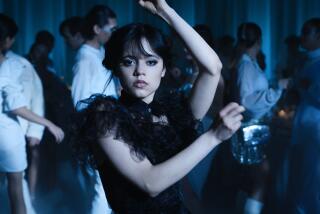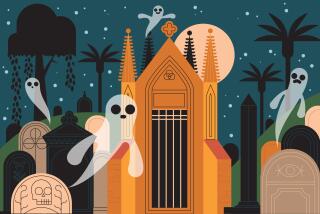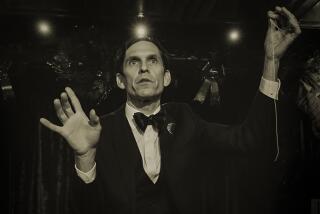For a Good Scare, Turn to ‘Hauntrepreneurs’
GREELEY, Colo. — Inside the concrete walls of Distortions Unlimited, blood is spilled, decomposed bodies are wrapped in plastic and green ghoulish figures stare in horror.
Company owners Ed and Marsha Edmunds don’t get scared very often. Good thing, because they are among the top “hauntrepreneurs” in the nation, manufacturing masks, creepy animatronics and frightening set displays for haunted houses and amusement parks worldwide.
They also fashioned props and sets for Alice Cooper’s current tour. Cooper personal manager Toby Mamis said Distortions’ creations fit perfectly with the creepy and theatrical nature of the shock rocker’s shows.
“We met them during their brutal planet attraction, and it was one of the scariest things we’d ever seen,” Mamis said, referring to a 1997 show that Distortions presented. “And it’s got to be scary to scare Alice.”
Edmunds started out making masks as a University of Northern Colorado undergraduate in the 1970s. The privately owned company grew from his love of scary movies, “Tales From the Crypt” comic books and the TV show “The Outer Limits.”
When Morris Costumes picked up his line of masks around 1980, he could afford to do more creative work.
Edmunds, 47, will not reveal revenue figures, but said they were in the millions per year. Marsha Taub Edmunds got involved after the two met in college and married.
In the far corner of the 24,000-square-foot Distortions warehouse, welders put finishing touches on a fake electric chair that brutally jerks a life-size dummy with a black hood over its head. Nearby, workers crate a pale, life-size mannequin strapped to a table, its lower half hacked to the bone and fake blood spewing from its wounds.
Snaking around the cluttered warehouse is an assembly line for hundreds of claw hands. Piles of unpainted rubber masks and body parts litter the floor.
“I honestly don’t know what it is about severed heads and blood-spewing creatures, but people sure love a little gore,” Edmunds said.
But, he added, it’s getting harder and harder to scare children. “With the advent of HBO and kids seeing $50 million in special effects in science fiction movies, it’s taking really dramatic stuff to make an impression,” he said. “We’re working hard to break new ground.”
His newest idea, “The Beast,” is a creature 150 feet long and 25 feet high. People literally walk into the mouth, past internal organs and half-chewed victims. It comes complete with sound effects of gross bodily functions. Edmunds plans to preview it at a November trade show for theme park owners in Orlando, Fla.
Haunted house owner Nick Trahanas says Edmunds is a household name among “hauntrepreneurs.”
Trahanas owns a spooky ride and two haunted houses at the historic Rye Playland in Rye, N.Y. Edmunds helped him renovate the ride with zombies, gory scenes of guillotines lopping off heads and animated creatures that move when patrons pass.
“There’s really no one doing what Ed is doing,” Trahanas said. “He’s got quite a niche.”
Edmunds and his employees come up with ideas for the creatures and do most of the assembly at the warehouse using latex, silicon and metals.
Prices vary from $12.95 for a pair of alien rubber hands to $6,889 for a life-size electric chair and a $22,000 animated sleeping giant that screams and sits up when people walk past. Distortions sells its products online.
Halloween is becoming more popular and haunted house budgets are increasing. The National Retail Assn. said Halloween revenues are second only to Christmas when it comes to decorations. An estimated $6.9 billion will be spent this year on costumes, candy and decorations, association spokeswoman Ellen Tolley said.
She said consumers spend more because the holiday is becoming more than just one night, with haunted houses and fright festivals lasting all month.
There are some things Edmunds will not do. His life-size electric chairs and guillotines are wildly popular, and he’s expecting to sell more than 100 torture devices this year. But he refuses to make likenesses of real killers like Osama bin Laden or Timothy McVeigh.
“What we make here is so fantastical and so phony, I don’t want to deal with that actual evil,” Edmunds said.
More to Read
The biggest entertainment stories
Get our big stories about Hollywood, film, television, music, arts, culture and more right in your inbox as soon as they publish.
You may occasionally receive promotional content from the Los Angeles Times.










